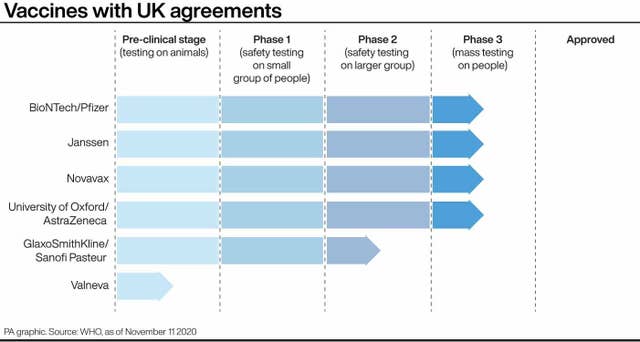
The University of Oxford is expected to release data on the effectiveness of its coronavirus vaccine in the coming weeks, with the latest trial results suggesting it produces a strong immune response in older adults.
The ChAdOx1 nCov-2019 vaccine has been shown to trigger a robust immune response in healthy adults aged 56-69 and people over 70.
Phase two data, published in The Lancet, suggests one of the groups most vulnerable to serious illness and death from Covid-19 could build immunity, researchers say.
Read more: How does the Oxford Covid-19 vaccine work?
According to the researchers, volunteers in the trial demonstrated similar immune responses across all three age groups (18-55, 56-69, and 70 and over).
 (PA Graphics)
(PA Graphics)
The study of 560 healthy adults – including 240 over the age of 70 – found the vaccine is better tolerated in older people compared with younger adults.
Volunteers received two doses of the vaccine candidate, or a placebo meningitis vaccine.
No serious adverse health events related to the vaccine were seen in the participants.
READ MORE: Teachers 'being told to keep self-isolation numbers low'
The results are consistent with phase one data reported for healthy adults aged 18-55 earlier this year.
Dr Maheshi Ramasamy, investigator at the Oxford Vaccine Group and consultant physician, said: “Older adults are a priority group for Covid-19 vaccination, because they are at increased risk of severe disease, but we know that they tend to have poorer vaccine responses.
“We were pleased to see that our vaccine was not only well tolerated in older adults, but also stimulated similar immune responses to those seen in younger volunteers.
“The next step will be to see if this translates into protection from the disease itself.”
Study lead author Professor Andrew Pollard, from the University of Oxford, said: “Immune responses from vaccines are often lessened in older adults because the immune system gradually deteriorates with age, which also leaves older adults more susceptible to infections.
“As a result, it is crucial that Covid-19 vaccines are tested in this group who are also a priority group for immunisation.”
READ MORE: Coronavirus Scotland - What is the Covid-19 rate for my local authority area?
Researchers say their findings are promising as they show that the older people are showing a similar immune response to younger adults.
Dr Ramasamy added: “The robust antibody and T-cell responses seen in older people in our study are encouraging.
“The populations at greatest risk of serious Covid-19 disease include people with existing health conditions and older adults.
“We hope that this means our vaccine will help to protect some of the most vulnerable people in society, but further research will be needed before we can be sure.”
The study also found the vaccine, being developed with AstraZeneca, was less likely to cause local reactions at the injection site and symptoms on the day of vaccination in older adults than in the younger group.
 Vials of the Oxford coronavirus vaccine (Sean Elias/PA)
Vials of the Oxford coronavirus vaccine (Sean Elias/PA)
Adverse reactions were mild – injection-site pain and tenderness, fatigue, headache, feverishness and muscle pain – but more common than seen with the control vaccine.
Thirteen serious adverse events occurred in the six months since the first dose was given, none of which were related to either study vaccine.
The authors note some limitations to their study, including that the participants in the oldest age group had an average age of 73-74 and few underlying health conditions, so they may not be representative of the general older population, including those living in residential care settings or aged over 80.
Phase three trials of the vaccine are ongoing, with early efficacy readings possible in the coming weeks.
UK authorities have placed orders for 100 million doses of the vaccine – enough to vaccinate most of the population – should it receive regulatory approval.
The Oxford findings come after Pfizer and BioNTech announced that their vaccine candidate has shown 95% efficacy, with a 94% effectiveness in those aged 65 and over.
Forty million doses of that vaccine have been bought by the UK, with rollout potentially starting in early December if the jab is given the green light by regulators.
Earlier in the week US biotech firm Moderna released data suggesting its vaccine is almost almost 95% effective.



Why are you making commenting on The Herald only available to subscribers?
It should have been a safe space for informed debate, somewhere for readers to discuss issues around the biggest stories of the day, but all too often the below the line comments on most websites have become bogged down by off-topic discussions and abuse.
heraldscotland.com is tackling this problem by allowing only subscribers to comment.
We are doing this to improve the experience for our loyal readers and we believe it will reduce the ability of trolls and troublemakers, who occasionally find their way onto our site, to abuse our journalists and readers. We also hope it will help the comments section fulfil its promise as a part of Scotland's conversation with itself.
We are lucky at The Herald. We are read by an informed, educated readership who can add their knowledge and insights to our stories.
That is invaluable.
We are making the subscriber-only change to support our valued readers, who tell us they don't want the site cluttered up with irrelevant comments, untruths and abuse.
In the past, the journalist’s job was to collect and distribute information to the audience. Technology means that readers can shape a discussion. We look forward to hearing from you on heraldscotland.com
Comments & Moderation
Readers’ comments: You are personally liable for the content of any comments you upload to this website, so please act responsibly. We do not pre-moderate or monitor readers’ comments appearing on our websites, but we do post-moderate in response to complaints we receive or otherwise when a potential problem comes to our attention. You can make a complaint by using the ‘report this post’ link . We may then apply our discretion under the user terms to amend or delete comments.
Post moderation is undertaken full-time 9am-6pm on weekdays, and on a part-time basis outwith those hours.
Read the rules here